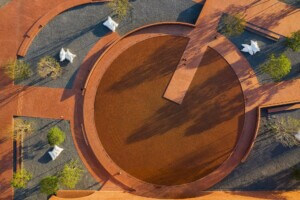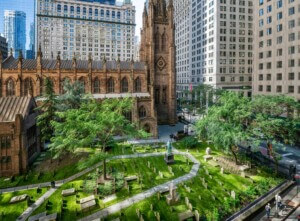The American Society of Landscape Architects (ASLA) has announced the winners of its 2011 Student Awards. This year’s student honorees have developed concepts ranging from hillside habitats in Haiti, to vegetated houses in Taiwan, to a reclaimed airfield in Berlin. Entries demonstrate an idealistic and urgent approach to problem solving for today’s and tomorrow’s pressing social issues.
[ Also be sure to check out the winners of the ASLA 2011 Professional Awards. ]
A jury comprised of fellows and members of the ASLA selected 40 winners in seven categories including Residential, Analysis & Planning, and General Design. Of note, the jury was impressed with the graphic skill both the graduate and undergraduate students possessed, along with the breadth of their theoretical survey. Awards will be presented on November 2 at the ASLA Annual Meeting in San Diego.
General Design Category
Award of Excellence
Tempelhof Wasserpark
Johanna F. Barthmaier
Faculty Advisor: Martin Rein Cano and Yadiel Rivera Diaz
University of Pennsylvania
From the project statement:
Berlin, Germany lies close to the water table and with an overwhelming amount of annual rainfall, the city has more water than its infrastructure can handle. Tempelhof airport provides a clear open space inside the city to test a new form of water management in Berlin, where storm and ground waters are reserved, absorbed and filtrated through pools, plantings and landforms. A module based on the folds of a paper airplane helped generate the design, which allows water to move and collect throughout the site. Depending on the weather, the ephemeral movement of water sets the stage for unique programs to develop and informs visitors about the local hydrology.
Honor Awards
Vertical Territories
Chen Chen, E. Scott Mitchell, and Amy Whitesides
Faculty Advisors: Pierre Bélanger, ASLA and Christian Werthmann
Harvard Graduate School of Design
From the project statement:
Vertical Territories proposes the redevelopment of South Weymouth Naval Air Station as productive open space. It promotes alternative energy innovation, habitat preservation, floodwater management and freshwater conservation through a layered approach that allows for functional density without compromising the expansive quality of the ground plane. The project uses technology and conservation to stitch together adjacent but disconnected urban centers and serves as a prototype for urban planning that recognizes the critical infrastructural services landscape provides.
The Docks: Engaging the Edge at Brooklyn Basin
Michal Kapitulnik, Catherine McDonald, Alex Schuknecht, and Robert Tidmore
Faculty Advisor: Judith Stilgenbauer
University of California, Berkeley
From the project statement:
At the threshold of industry, infrastructure, and the degraded water edge, the Bay Trail is fragmented at Brooklyn Basin. Leveraging these rich adjacencies, the proposed design opens up access to the Bay and knits the trail back together through a series of docks, piers and gardens. The Bay edge is transformed to create increased diversity of terrestrial and aquatic habitats. Immersive tectonic experiences arise, providing spaces for cultural and educational engagement while promoting stewardship.
Evans Way: Skating the Emerald Necklace
Anne Weber
Faculty Advisor: Jane Hutton
Harvard Graduate School of Design
From the project statement:
Skating the Emerald Necklace reimagines Evans Way Park, a small public park along Boston’s Emerald Necklace, as a dual-functioning skate park that blends skater, pedestrian and storm water flow in a continuous mobius strip of circulation. Morphing the existing Olmstedian-influenced design into a kind of post-punk pastoral, Evans Way becomes Boston’s first skate park, filling a city-wide programmatic need, while embracing the diverse forms of circulation within contemporary urban space.
Residential Design Category
Award of Excellence
Vegetation House: House for Being the Medium of Plant Growth
Jheng-Ru Li and Chieh-Hsuan Hu
Faculty Advisors: Yu-Tung Liu, Yuan-Rong Li, Shiau-Yun Lu and Chor-Kheng Lim
National Chiao Tung University
From the project statement:
Concerning the problem of farmhouses in the suburban areas.This project is aimed to focus on whether the building creates a suitable environment for many different types of plants to grow naturally. Just as a stone in the forest is attached to a plant by the local environment, the building should not change or, worse, destroy the original ecosystem; it should coexist in harmony with the ecosystem and allow a diversity of plants to grow smoothly alongside it.
Analysis and Planning Category
Award of Excellence
UPGRADE / RETROFIT: Strategies for Re-Urbanization of Haiti’s Hillsides
Jeff Powers and Byron White
Faculty Advisor: Liat Margolis
University of Toronto
From the project statement:
UPGRADE/RETROFIT is an hybridized architectural and landscape design plan that envisions a new possibility for Haiti’s development beyond the short term disaster relief solutions currently in use. The earthquake that struck Haiti in 2010, was another chapter in a series of events that have systematically destroyed the Haitian landscape and communities. Within the current framework for redevelopment, sustainable systems are not adequate. Instead, we envision a strategy for rehabilitation, augmentation and surplus.
Honor Awards
Canals as Greenways
Paul Toenjes and Shuntaro Yahiro
Faculty Advisor: Lake Douglas
Louisiana State University
From the project statement:
Taking the vast expense of a large infrastructural project and turning it into an amenity can be achieved through distributing the infrastructure throughout the community. It is possible to create a resilient canal system for New Orleans which deals with water storage throughout the city, creating a green network through which the community can be redefined. Each infrastructure piece has the potential to be beautiful, have significant economic impact and provide much needed greenspace.
Communications Category
Award of Excellence
Lorna Allen, Tucker Beeninga, Sarah Elsaesser, Matt Evans, Benjamin Hood, Michael Lynskey, Preston Montague, Leslie Morefield, Lindsay Ruderman, Scott Simmons, Caitlin Smolewski, Matt Tomasulo, David Toms, and Luke Wallenbeck
Faculty Advisor: Andrew Fox
North Carolina State University
From the project statement:
SHIFT:infrastructure is an annual student produced publication sponsored by the North Carolina State University Student Chapter ASLA. Recognizing that students represent the next generation of leaders and design innovators, we created SHIFT: to provide a scholarly and provocative forum for professional-reviewed student research into emerging issues at the forefront of landscape architecture theory and practice. We seek to foster creative interaction across disciplinary boundaries and raise awareness of emerging trends within academic and professional communities.
Community Service
Award of Excellence
Adams Elementary School Garden for Experiential Learning
Amanda J. Dunlap
Faculty Advisor: Keith Christensen, PhD
Utah State University
From the project statement:
In a time when art programs are being removed from schools as educational funding is cut short, an opportunity surfaced to combine core elementary school curriculum with the arts through landscape architecture. Based on the hands-on, experiential learning environment of the studio, the creation of twenty lessons integrated landscape architecture, mathematics, creative writing, science, and art into fourth grade curriculum. From inception to implementation, students worked through the design process to create a school entryway.
Student Collaboration
Award of Excellence
plantLAB
Mike Cook, Chris DeHenzel, Brian Gillett, Rockne Hanish, and Darryl Jones
Faculty Advisor: Judith Stilgenbauer
University of California, Berkeley
From the project statement:
The plantLAB is an experiment in hydroponic gardening and landscape garden design, conceived and constructed by a team of graduate and undergraduate architecture/landscape students for the 2011 San Francisco Garden Show. The project addresses issues of food production and normative definitions of “garden” through an interpretation of hydroponic methods for a temporary gallery exhibition. It consists of a modular steel frame that supports an irrigation system and a volumetric field of hydroponically grown lettuce.
To see all the winners and honorees visit ASLA.










